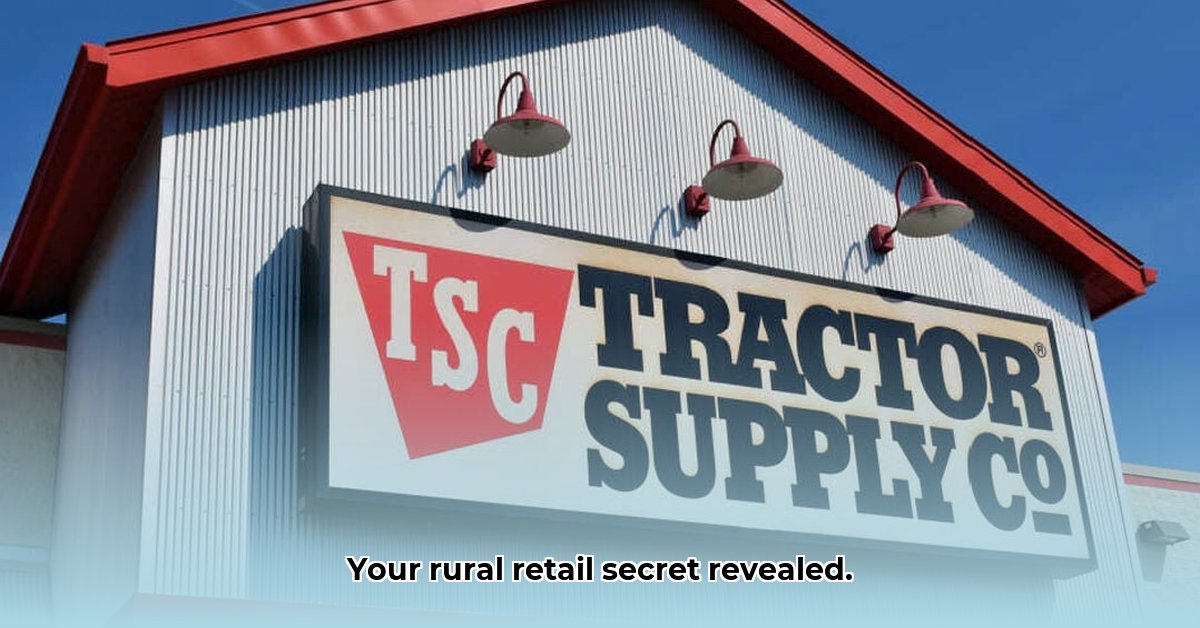
Tractor Supply Co. Warsaw: A Deep Dive into Rural Retail
Tractor Supply Company (TSC) in Warsaw, Indiana, serves as a vital retail anchor for the surrounding rural community, catering to a diverse clientele including farmers, gardeners, and pet owners. This analysis examines TSC Warsaw's market position, competitive landscape, strategic opportunities, and risk factors, providing actionable insights for stakeholders. Does TSC possess the necessary strategies to maintain its competitive edge in a rapidly evolving market? The answer lies in a multifaceted approach encompassing both physical and digital strategies. For a similar analysis on another TSC location, see the Miami store analysis.
Market Analysis: Strengths and Weaknesses
TSC Warsaw's core strength lies in its extensive product portfolio, encompassing a wide range of goods relevant to rural life, from farm supplies and livestock feed to gardening equipment and pet products. This broad selection, combined with convenient store location and extended operating hours, significantly enhances customer accessibility. However, the company faces challenges from the growth of online retailers, which often offer lower prices and a broader selection. Supply chain vulnerabilities, exacerbated by factors such as weather events and global disruptions, also pose a significant risk to TSC's ability to maintain consistent inventory levels. This raises the crucial question: How can TSC effectively leverage its existing strengths while mitigating its weaknesses?
Competitive Landscape: Navigating the Retail Battlefield
TSC Warsaw competes with both online giants and smaller, specialized brick-and-mortar stores. Online competitors offer the advantage of convenience and potentially broader selection, while niche retailers may exceed TSC in specific product categories. This competitive pressure necessitates a proactive strategy to leverage TSC's unique advantages and address the challenges posed by its competitors. The critical challenge for TSC lies in seamlessly integrating online and offline offerings to provide an unparalleled customer experience.
Strategic Opportunities: Charting a Course for Success
TSC Warsaw can implement several short-term and long-term strategies to enhance its competitive position. Short-term strategies (0-1 year) include enhancing its online presence through a user-friendly website and targeted digital marketing, as well as strengthening supplier relationships to mitigate supply chain risks. Long-term strategies (3-5 years) focus on embracing omnichannel retailing, investing in data analytics to better understand customer behavior, forging strategic partnerships to expand product offerings, and implementing sustainability initiatives to attract environmentally conscious consumers. These strategies, if implemented effectively, could lead to significant improvements in sales and customer loyalty.
Strategies Tailored to Customer Groups
| Customer Segment | Short-Term Strategy | Long-Term Strategy |
|---|---|---|
| Farmers | Offer specialized workshops and expert advice, focusing on local needs. | Provide personalized financial services and farm management tools through partnerships. |
| Gardeners | Expand organic and sustainable gardening product selection. | Develop a loyalty program and a gardening community platform for sharing tips and advice. |
| Pet Owners | Enhance pet food selection and offer grooming services. | Partner with local animal shelters and promote pet adoption initiatives. |
Risk Assessment: Mitigating Potential Threats
| Risk Category | Probability | Impact | Mitigation Strategy |
|---|---|---|---|
| Supply Chain Disruption | Medium | High | Diversify suppliers, explore alternative distribution channels, and build buffer stock. |
| Online Competition | High | Medium | Enhance online presence, develop a superior customer experience, and offer exclusive deals. |
| Shifting Consumer Needs | Medium | Medium | Conduct regular market research, adapt product offerings, and stay agile to trends. |
| Regulatory Changes | Low | Medium | Maintain compliance with all regulations and actively track upcoming changes. |
Effective risk mitigation strategies are crucial for ensuring the long-term success of TSC Warsaw. Proactive measures can significantly reduce the impact of potential disruptions and maintain operational stability.
Conclusion: Adapting to Thrive
Tractor Supply Co. Warsaw occupies a crucial position within its local community. However, the evolving retail landscape demands constant adaptation. By strategically addressing its challenges, leveraging its strengths, and implementing the recommendations outlined above, TSC can solidify its market position and ensure its continued success in the years to come. The future of TSC hinges on its ability to effectively integrate online and offline strategies, cater to diverse customer needs, and maintain a proactive approach to risk management. A clear, data-driven approach to decision making will be key to navigating the complexities of the modern retail environment.